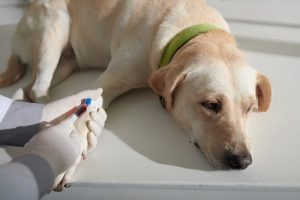Leptospirosis in dogs is a highly contagious bacterial disease that is often fatal. It is relatively uncommon in the UK, but some areas have many more cases than others. Dogs of any age can catch leptospirosis.
Leptospirosis is spread through the urine of infected animals and in infected water sources. It causes severe damage to the liver and kidneys in affected dogs. The best way to prevent disease is through yearly vaccination. Leptospirosis is zoonotic, which means it spreads to people who can also become infected.
Overview
What is leptospirosis in dogs?
Leptospirosis is a contagious bacterial infection in dogs.
- It is spread in the urine and blood of infected animals, both domestic and wild (rats, mice, pigs, cows, and dogs).
- Dogs catch it through direct contact with infected animals.
- They can also catch it through infected water or soil (in puddles, lakes, rivers, etc.). Leptospirosis bacteria can survive in water for months.
- The bacteria enters the body via the mouth, nose, or open wounds and travels to the bloodstream. It then travels to the liver, kidneys, and other organs, where it causes severe damage.
- The disease progresses quickly without treatment and, unfortunately, often leads to death.
- Some dogs recover if they have mild symptoms and treatment is started early.
- Infected animals can shed the bacteria for years after recovery.
- There are several different types of leptospirosis that can cause different symptoms.
Symptoms
Symptoms of leptospirosis in dogs
The symptoms of leptospirosis in dogs can vary depending on what type your dog is infected with. Signs include one or more of the following:
- Fever
- Lethargy or weakness
- Not eating
- Drinking more than normal
- Vomiting and diarrhoea
- Dark urine
- Tendency to bleed (i.e. nose bleeds)
- Jaundice (yellow colour of gums and eyes)
- Limping
- Painful muscles
- Breathing abnormalities

- Lethargy and weakness can be a sign of Leptospirosis in dogs
Risk
Are some dogs more at risk of leptospirosis than others?
The risk factors for leptospirosis include the following:
- Non-vaccinated dogs
- Area: higher number of cases in the south-east of England as well as the west Midlands and south-west. Leptospirosis is more common in warm areas with high rainfall.
- Dogs that have contact with livestock, wildlife or rodents
- Dogs that swim have a higher risk of coming into contact with infected water
Diagnosis
How is leptospirosis diagnosed in dogs?
A full physical exam is the first step in the investigation. Treatment may already be started before the results of tests have returned if the disease is suspected. Tests include:
- General or specific blood tests to check organ function, especially kidney and liver
- Blood or urine tests to check for the Leptospirosis bacteria
- General urine tests
- Imaging: x-rays, ultrasound or CT scans to check for damage to certain organs
Vet treatment
What’s the treatment for leptospirosis in dogs?
Treatment depends on how severe the disease is when it’s diagnosed. Most dogs will require hospitalisation for close monitoring of their vital signs, such as heart rate and blood pressure.
- Antibiotics, specific for leptospirosis, often given by injection into the vein
- Fluids into the vein to help with dehydration and electrolyte imbalances
- A urinary catheter may be needed
- Regular blood tests to check the liver and kidney function
- Anti-sickness medications
- Appetite stimulants
- Pain relief
- Nutritional support
- Dialysis
- Oxygen therapy
Further treatment may be needed, depending on what organs are damaged and how severe the damage is. Leptospirosis can lead to anaemia, kidney disease, inflammation of the pancreas, liver disease, and lung damage. Long-term treatment may be needed for some dogs, such as those with chronic kidney disease.

- Hospitalisation is usually needed as part of treatment
An important factor in the treatment of leptospirosis is the isolation of infected dogs. This is to prevent its spread to other animals and humans. Dogs still shed the bacteria even after recovery, usually for 4-6 weeks, but it has also been shown that some dogs can shed it for years.
The costs of treating leptospirosis can be very high due to the need for hospitalisation and isolation. Sadly, some dogs become extremely ill with leptospirosis, and euthanasia may be advised on the grounds of preventing suffering.
Home treatment
How to look after a dog with leptospirosis at home
Most dogs with leptospirosis will need hospitalisation in a vet practice, which may last for days to weeks. Once home, your dog will need close monitoring and isolation to prevent spread to people and other animals.
- Make sure your dog is eating and drinking normal amounts
- Allow them to rest and recover somewhere quiet and comfortable
- Check their body weight regularly to make sure they are not losing weight
- Give any medication as instructed by your vet. Be careful not to miss any doses
- If the symptoms worsen, make sure to get your dog checked over right away
Isolation is needed for dogs that are suspected or diagnosed with leptospirosis. Your vet will be able to advise for how long, but it is often for 4-6 weeks at least.
- Make sure to avoid contact with your dog’s urine. Always wear gloves and use a disinfectant to clean the urine.
- Wash your hands after any contact with your dog.
- Strict hygiene measures help prevent the spread.
Prevention
Tips on how to prevent leptospirosis in dogs
- Vaccinate your dog every year against leptospirosis. There are a few different types of effective vaccines for dogs, both L2 and L4. Speak to your local vet about which vaccine offers the best protection for your area. Leptospirosis is usually included in the primary course of vaccines for puppies.
- Always carry your unvaccinated puppy if going out in public and avoid contact with dogs that are not vaccinated.
- Leptospirosis is common in Europe. Make sure to take extra precautions when travelling with your dog.
- Take steps to prevent rodents in your house and garden: secure your rubbish, clean up any spillages immediately, and do not leave any pet food lying around.
- Don’t let your dog eat rodents.
- Minimise contact with wild and farm animals.
- Keep your dog away from stagnant water, and don’t allow them to drink from puddles.
Worried about vaccinations and their adverse effects?
The overall rate of adverse reactions to the leptospirosis vaccine in dogs is extremely low. The reported reactions are less than 2 in 10,000 (for the L2 vaccine) and less than 7 in 10,000 (for the L4).
Our Joii vets are available 24 hours a day for advice about any questions you have. Download the app and speak to a professional if you have any concerns.
Is my family at risk of catching leptospirosis?
Yes, leptospirosis can spread from dogs and other animals to humans. It can cause serious disease in people. Speak to your GP if you have any concerns.
When to worry
When you should be worried about leptospirosis in dogs
Seek help from a vet if:
- You suspect your dog has leptospirosis
- Your dog has yellow gums or eyes
- Your dog has severe vomiting or diarrhoea
Call us and speak to one of our Joii vets if:
- You have any questions about vaccinations
- Your dog has mild vomiting or diarrhoea
- You have any questions about preventing leptospirosis








